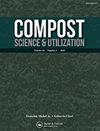Effect of Acidithiobacillus thiooxidans Inoculation on the Chemical Properties of Saline Compost
IF 0.9
4区 农林科学
Q3 ECOLOGY
引用次数: 0
Abstract
Abstract Bacterial species of the genus Acidithiobacillus have been proved to reduce soil salinity, but their chemical impact on a saline compost has not been reported. This work is aimed to evaluate the effects of A. thiooxidans on the chemical properties of a saline compost formulation. When added to a microcosm under nonsterile conditions, a sulfur-supplemented A. thiooxidans inoculum lowered pH to 7.16, reduced exchangeable sodium levels to 97 cmol kg−1, and increased electrical conductivity to 7.93 dS m−1 after 720 h. No differences in bacterial fingerprint were observed after adding A. thiooxidans, either supplemented with sulfur or not. These results suggest that inoculating saline composts with sulfur-oxidizing bacterial strains of the genus Acidithiobacillus could help to decrease salinity-associated parameters, and it has the potential of reducing the impact of prolonged application of organic fertilizers on the soil. Additionally, it could be a valuable tool to remediate high-salinity soils.氧化硫酸硫杆菌接种对盐渍堆肥化学性质的影响
摘要酸性硫杆菌属细菌已被证明可以降低土壤盐度,但其对含盐堆肥的化学影响尚未报道。本工作旨在评估氧化硫A.对盐水堆肥配方化学性质的影响。当在非无菌条件下添加到微宇宙中时,添加硫的氧化硫a.接种物将pH降低到7.16,将可交换钠水平降低到97 cmol kg−1,并在720后将电导率提高到7.93 dS m−1 h.添加氧化硫A.后,无论是否添加硫,都没有观察到细菌指纹的差异。这些结果表明,用酸性硫杆菌属硫氧化细菌菌株接种含盐堆肥有助于降低盐度相关参数,并有可能减少长期施用有机肥对土壤的影响。此外,它可能是修复高盐度土壤的一个有价值的工具。
本文章由计算机程序翻译,如有差异,请以英文原文为准。
求助全文
约1分钟内获得全文
求助全文
来源期刊

Compost Science & Utilization
农林科学-生态学
CiteScore
4.10
自引率
0.00%
发文量
0
审稿时长
>36 weeks
期刊介绍:
4 issues per year
Compost Science & Utilization is currently abstracted/indexed in: CABI Agriculture & Environment Abstracts, CSA Biotechnology and Environmental Engineering Abstracts, EBSCOhost Abstracts, Elsevier Compendex and GEOBASE Abstracts, PubMed, ProQuest Science Abstracts, and Thomson Reuters Biological Abstracts and Science Citation Index
 求助内容:
求助内容: 应助结果提醒方式:
应助结果提醒方式:


